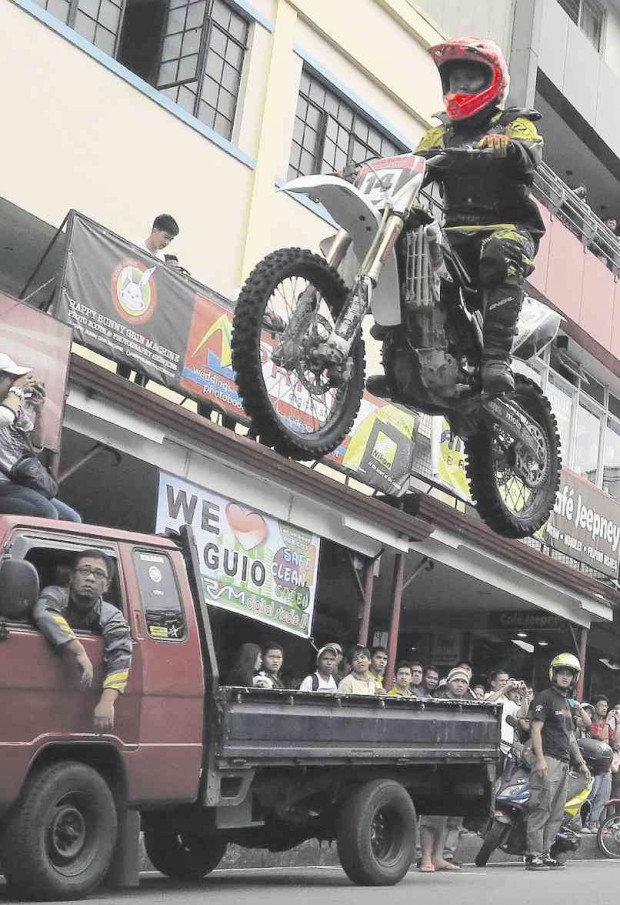
THE ONLY time motorcycles were allowed on downtown Session Road was for stunt exhibitions on Baguio Day in 2015. EV ESPIRITU
THE SUMMER capital has banned tricycles from all city roads since 2012, and has been regulating the routes of two-wheeled vehicles like motorcycles and bicycles on busy streets on the strength of ordinances which date back to 1948.
This is because the city government has not been enforcing all the traffic rules codified originally by the late Justice George Malcolm after Baguio was chartered as a city by the American colonial government in 1909.
The old laws actually forbid bikes and motorbikes from using Baguio streets.
But motorcycle clubs are now asking the city council to repeal all these “outdated” laws and allow them free access to all streets in this mountain city.
These groups approached the council during its Feb. 15 session, on the heels of an online controversy over a Baguio government memorandum, which some bloggers and social network sites mistook for a new law banning motorcycles and bicycles.
The memorandum, which Mayor Mauricio Domogan issued to a newly-installed Baguio police chief, Senior Supt. George Daskeo, on Feb. 4, outlined existing traffic ordinances in the city.
Domogan’s office said the directives were intended to regulate the movement of motorcycles and bicycles through Baguio streets, and keep a smooth traffic flow.
Oldest ordinance
There was a call for the repeal of antiquated ordinances in Baguio that prohibited the use of bicycles on city streets. These laws, in the first place, have not been implemented to the letter. PHOTO ABC/INQUIRER.net
But for the past 50 years, bicycles and motorcycles have not rolled through busy Session Road, the main street, in downtown Baguio because that was how these laws have been interpreted.
The oldest regulation on two-wheeled vehicles is Ordinance No. 66 series of 1948, which prohibits motorcycles or tricycles from “roads, streets, or bridle paths within city limits except on specified areas.”
The 1948 ordinance was updated in 1960 by Ordinance No. 329 to allow the mayor to issue temporary permits to motorcycling “excursionists” and tourists who drive up to Baguio “for relaxation and sightseeing.” However, these permits were only granted to “nonresidents or visitors.”
In 1965, Ordinance No. 329 was amended twice, to prescribe exemptions. For instance, Ordinance No. 423 no longer prohibits motorcycles, tricycles, scooters and bicycles, which were intended for hire at Burnham Park (a reference to the bicycle renting area that still exists today), and the two-wheeled vehicles used exclusively for parcel and letter couriers, or newspaper deliveries.
This ordinance still banned bikes and motorbikes, and has not been nullified by subsequent laws, according to the Office of the Mayor.
Bicycle lanes
In 2011, bicycle enthusiasts like anthropologist Padma Perez campaigned for the enactment of bicycle lanes, given the demands for clean air in Baguio.
The lobby included a call for the repeal of antiquated ordinances that prohibited the use of bicycles on city streets. These laws, in the first place, have not been implemented to the letter.
Despite city government commitment to plan out a bicycle route, the promises were never translated into law.
The following year, the government passed Ordinance No. 28 series of 2012 stipulating a ban on tricycles for all city streets. The city government pursued this measure on the request of the Baguio police, which said that the tricycle “was not a suitable mode of transportation in the road design of Baguio due to its up and down terrain.”
Ordinance No. 28 also cited the Baguio police’s findings that “the presence of tricycles would impede the smooth flow of traffic especially on the ascending portions of the road.”
Councilor Elmer Datuin, who chaired the council committee on laws which reviewed the proposal to lift the prohibition for bicycles and motorcycles in 2000, said the process required public consultations.
However, the consensus in these consultations was to retain the prohibition, Datuin said during the Feb. 15 council session. That left the council with no recourse but to drop the proposal, he said.
Domogan has asked the police to again tolerate motorcycles driving through main streets, except on Session Road, due to the harsh reactions.
Scrap these laws
But motorcycle and bicycle enthusiasts are urging the council to scrap these laws altogether.
Juancho Tabat, governor of the Cordillera Motorcycle Riders Federation Inc., said, “We need to drive through Session Road and other primary roads because these are shorter routes to our destinations. All we ask is that we be treated like other Baguio motorists.” With a report from Jessica Tabilin